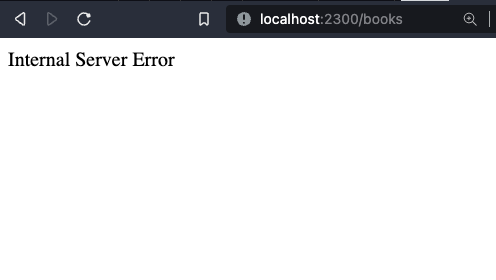V2.2: Exception handling
When a request crashes with an exception, you may want to handle it in a graceful manner. To do this, you can use handle_exception in your actions.
Actions do not handle exceptions raised by your application by default. To handle exceptions, you need to define how a specific exception type should be translated into an HTTP response.
An exception handler can be a HTTP status code (eg. 500, 401), or a symbol that represents a method on the action.
Status codes
# app/actions/books/index.rb
module Bookshelf
module Actions
module Books
class Index < Bookshelf::Action
handle_exception StandardError => 500
def handle(request, response)
raise "error"
end
end
end
end
end
In the above action, when StandardError is raised in the #handle method, a basic 500 Internal Server Error will be returned.

Custom method handlers
To do more with an exception than simply rendering a particular status code, call a method by providing a symbol with the method’s name:
module Bookshelf
module Actions
module Books
class Index < Bookshelf::Action
handle_exception RecordNotFound => 404
handle_exception StandardError => :handle_standard_error
def handle(*, response)
raise "error"
end
private
def handle_standard_error(request, response, exception)
response.status = 500
response.format = :json
response.body = {error: "Sorry, something went wrong handling your request"}.to_json
end
end
end
end
end
Here, when StandardError is raised, #handle_standard_error will prepare a JSON response.
Methods used for exception handling accept three arguments: the request, the response and the exception being handled.
Handling exceptions in base actions
Rather than configure exception handling in every action, it’s usually convenient to configure it once, either in your app’s base action, or in the base action of a slice.
If you use an error reporting service like Bugsnag or Sentry, you can report on exceptions here too.
# app/action.rb
require "hanami/action"
module Bookshelf
class Action < Hanami::Action
include Deps["sentry"]
handle_exception StandardError => :handle_standard_error
private
def handle_standard_error(request, response, exception)
sentry.capture_exception(exception)
response.status = 500
response.body = "Sorry, something went wrong handling your request"
end
end
end
In development, where seeing a stack trace can be useful, reraise exceptions in order to make them visible in your browser.
def handle_standard_error(request, response, exception)
if Hanami.env?(:development)
raise exception
else
response.status = 500
response.body = "Sorry, something went wrong handling your request"
end
end
